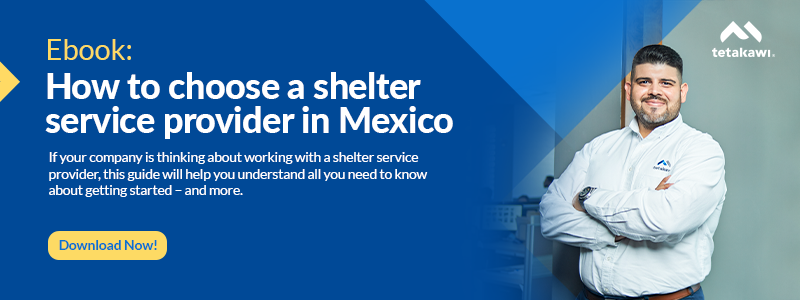Expanding into Mexico helps manufacturers reduce costs, strengthen supply chains, and build long-term stability. The challenge is launching quickly while staying compliant and in control.
That’s where Tetakawi comes in.
We’re not consultants or contract manufacturers. We own and operate Manufacturing Campuses across Mexico, environments that give foreign companies quick access to facilities, people, and administrative services through our Shelter Framework. It’s a proven, cost-effective soft-landing model for building and growing manufacturing operations in Mexico.
What Is a Tetakawi Manufacturing Campus?
A Manufacturing Campus is a controlled environment where facilities, workforce, and services work together to help companies start operations immediately.
A Tetakawi Manufacturing Campus is more than real estate, it’s a ready-to-run system designed for speed and growth. Inside each campus, you’ll find:
- Real Estate: Move-in-ready, pre-permitted buildings with utilities access and security already in place.
- Workforce Pipeline: Recruiting links with local schools and universities, plus on-site HR for hiring, payroll, benefits, and union relations under Mexican labor law.
- On-Site Services: Facilities, EHS, import/export, purchasing, accounting, and more all managed by Tetakawi’s local teams.
- Shelter Framework: The legal and administrative system that lets foreign manufacturers begin work right away under Tetakawi’s programs (like IMMEX for trade).
In short: The campus gives you the environment, buildings, and people powered by Tetakawi’s Shelter Framework and on-site services. This is why many companies begin production in less than 30 days.
Proven in Practice: What Experience Taught Us
After decades of helping manufacturers enter Mexico, Tetakawi has built a playbook grounded in real-world experience:
- Parallel planning runs permits, HR setup, and utilities at the same time to save weeks.
- Pre-engineered infrastructure removes common startup delays. Every building has planned electrical and KVA layouts before a tenant signs.
- Customs and trade templates streamline IMMEX paperwork and cross-dock logistics, reducing inspection risks.
- Approved vendor networks speed sourcing of services, materials, and maintenance support.
- Integrated HR programs manage payroll, benefits, and union relations consistently.
- EHS compliance checklists are built from decades of cooperation with Mexican agencies to avoid permitting bottlenecks.
- Startup benchmarks show that most Tetakawi clients reach full production in 8–12 weeks, compared to six months for standalone plants.
Each new manufacturer benefits from these systems, refined through hundreds of successful launches.
The Shelter Framework: Fast, Compliant, and Secure
The Shelter Framework is Tetakawi’s system that allows foreign manufacturers to start operations in Mexico under our structure quickly and safely.
This model gives you immediate access to Tetakawi’s legal and administrative foundation. You stay in control of production while Tetakawi manages day-to-day compliance.
Tetakawi handles:
- Labor Management: Recruiting, payroll, benefits, and compliance with Mexican labor law.
- Import & Export: IMMEX administration, customs processing, and logistics coordination.
- Facilities: Maintenance, utilities, and infrastructure reliability.
- EHS: Permitting, audits, and safety oversight.
- Purchasing: Local sourcing and vendor coordination.
- Finance: Invoicing, VAT recovery, and audits.
This structure removes red tape so you can manufacture in Mexico immediately, with full compliance and minimal risk.
How Soft Landing Works
Here’s how Tetakawi helps companies begin manufacturing quickly and with confidence:
- Select your campus. Based on your needs, Tetakawi identifies a ready-to-use facility, saving 6–12 months of site work.
- Plug into the Shelter Framework. Tetakawi manages HR, compliance, and logistics so you can focus on production.
- Start operations. With people, space, and permits ready, you can begin production in as little as 30 days.
Why Speed Is Just the Beginning
Fast startups matter, but stable operations matter more. Tetakawi provides both.
Owning and managing our campuses lets us control quality and reliability. Each client benefits from proven systems for power, maintenance, and staffing. This keeps operations cost-effective and predictable across the entire manufacturing process.
Our clients gain:
- Faster launch times with pre-approved buildings.
- Lower labor costs and strong retention from reliable HR programs.
- Simpler supply chains through on-site Imprort & Export teams and consolidated freight options.
- Shared services that reduce costs and risk.
- Consistent, compliant operations supported by Tetakawi’s experience.
You’re not just starting fast, you’re building on a foundation built to last.
The Executive Advantage: Control Without Complexity
Executives need three things when expanding manufacturing into Mexico: speed, compliance, and control. Tetakawi delivers all three.
Under our model:
- You oversee production, quality, and output.
- We manage compliance, workforce, and infrastructure.
- You gain predictable, cost-effective operations across Mexico.
This lets you focus on your core manufacturing process while we handle the rest.
As one Tetakawi leader puts it: “There’s no shortcut to experience, but there is a process.” That process powers every campus we operate.
Why Tetakawi
Tetakawi runs Mexico’s most complete manufacturing platform a network of campuses home to more than 60 manufacturers, 24,000 employees, and 6.5 million square feet of managed space.
Companies in aerospace, medical devices, automotive, and electronics choose Tetakawi because we make manufacturing in Mexico practical, compliant, and fast—without giving up control or quality.
We make it possible to manufacture in Mexico, quickly, confidently, and at scale.
Ready to explore your options?
Schedule a consultation to learn how Tetakawi can help your company launch and scale operations in Mexico with confidence.
FAQs
How fast can we start manufacturing in Mexico?
It depends on the mode of entry you choose. A greenfield or standalone operation can take 12 to 18 months to launch, while most traditional shelter providers require about 8 to 12 weeks once permits and facilities are in place. By operating within a Tetakawi Manufacturing Campus, production can begin in as little as 30 days, because real estate, compliance, and administrative systems are already established.
What is the cost of shelter services within a Tetakawi campus?
The cost depends on your size, scope, and operational requirements. Because Tetakawi integrates infrastructure and services, total costs are often lower than managing separate leases, contractors, and administrative teams. For an accurate quote, companies complete a due diligence assessment to define scope and requirements before pricing.
How does the due diligence process work?
Before entering Mexico, Tetakawi guides each company through a structured due diligence process that includes cost modeling, labor availability studies, and a regulatory review. The goal is to confirm whether Mexico—and a specific campus—is the right fit for your operation. This process reduces risk and ensures executives have the full picture before committing.
What makes Tetakawi’s campuses different from industrial parks?
Most parks lease space. Tetakawi campuses combine real estate, workforce, and on-site services, supported by our Shelter Framework.
How do Tetakawi’s campuses differ from traditional shelter service providers?
Tetakawi integrates all three pillars: real estate, shelter framework, and on-site services. Our campuses are designed for immediate production startup, with power, utilities, and workforce pipelines already in place. This alignment turns setup into execution.
Where are Tetakawi’s campuses located?
We operate in Mazatlán, Hermosillo, Guaymas, Empalme, and Saltillo. Each location offers the same structure and support.
Subscribe
Sign up and stay informed with tips, updates, and best practices for manufacturing in Mexico.






